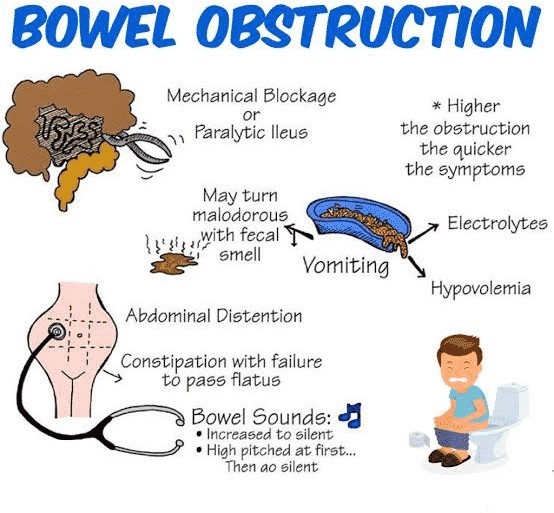A client is admitted with a small bowel (small intestine) obstruction. Which assessment findings are consistent with this diagnosis?
SELECT ALL THAT APPLY
Profuse vomiting.
Abdominal pain and distention.
Pain relieved by eating.
Blood in the stool.
Correct Answer : A,B,E
Small bowel obstruction can lead to the accumulation of gastric contents above the obstruction, causing vomiting.
Obstruction of the small bowel can result in crampy, colicky abdominal pain and abdominal distention.
Electrolyte imbalances, such as hypokalemia (low potassium), can occur due to vomiting and inadequate intake in cases of small bowel obstruction.
The following finding is not directly associated with small bowel obstruction:
Pain relief after eating is more commonly associated with peptic ulcer disease, not small bowel obstruction.
While blood in the stool can be seen in some cases of bowel obstruction, it is more commonly associated with lower gastrointestinal bleeding or other conditions affecting the colon, rather than small bowel obstruction.

Nursing Test Bank
Naxlex Comprehensive Predictor Exams
Related Questions
Correct Answer is C
Explanation
Morphine is a potent opioid analgesic that can depress the respiratory system. Respiratory depression is a potential adverse effect of morphine, and it is essential for the nurse to monitor the patient's respiratory rate regularly to ensure adequate oxygenation and prevent respiratory complications.
By checking the respiratory rate, the nurse can assess if the patient is breathing adequately and detect any signs of respiratory depression. If the respiratory rate is significantly decreased or the patient shows signs of respiratory distress (e.g., shallow or irregular breathing), immediate intervention is necessary to address the situation promptly.
Correct Answer is D
Explanation
Hip spica casts are typically used to immobilize the hip joint and are often used in the management of hip dysplasia or after surgery. These casts can cause restricted mobility and limit blood flow to the legs and feet, which can lead to complications such as swelling, decreased circulation, or pressure sores.
Checking capillary refill in the toes is a critical nursing intervention to assess for the presence of adequate circulation and blood flow to the affected limb. If capillary refill is slow or absent, it may indicate compromised circulation and require immediate intervention to prevent further complications.
Palpating a brachial pulse, assessing bilateral radial pulses, or auscultating the heart rate apically are not the priority nursing actions for an infant with a hip spica cast. While monitoring vital signs and circulation are important components of nursing care, the priority at this stage is to assess and manage the immediate postoperative needs of the patient, including monitoring for potential complications related to the hip spica cast.

Whether you are a student looking to ace your exams or a practicing nurse seeking to enhance your expertise , our nursing education contents will empower you with the confidence and competence to make a difference in the lives of patients and become a respected leader in the healthcare field.
Visit Naxlex, invest in your future and unlock endless possibilities with our unparalleled nursing education contents today
Report Wrong Answer on the Current Question
Do you disagree with the answer? If yes, what is your expected answer? Explain.
Kindly be descriptive with the issue you are facing.
